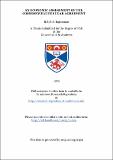An economic assessment of the Commonwealth sugar agreement
Abstract
This study is concerned with assessing the impact of the Commonwealth Sugar Agreement (CSA) on sugar production and exports in the major exporting countries of the Commonwealth by concentrating on a detailed analysis of one of the principal exporting members of the Agreement as a case study - Mauritius. Since the Agreement expired in 1974 after 24 years of operation, a detailed examination of the CSA can be expected to shed light on the general question of the usefulness and desirability of commodity agreements in general, and on the more specific question of the response of producers to given price and market incentives. The general approach adopted in this study is aimed at a comprehensive examination of the various factors relevant to the Commonwealth Sugar Agreement; apart from assessing the development of the CSA itself, it was found useful to conduct an economic analysis of the world sugar economy as a whole in order to place the CSA in a more global context. The next obvious step was to assess critically the economic theory underlying international commodity agreements in general, and to examine the justification for their application. Since commodity agreements represent, in an important sense, a man-made barrier to free international trade, we examine the implications of various agricultural policies on international trade in primary commodities as well as in sugar. In an attempt to obtain quantitative measurements of the effects of the CSA on sugar production in Mauritius, we devise a simultaneous-equation model to explain a number of important variables in the Mauritian sugar industry. Since agricultural models usually involve lagged variables being used as explanatory variables, we critically examine the literature on distributed lag models and a number of studies using such results, as well as the (usual) econometric problems that these models invariably involve. We finally present our model and the results obtained from applying the two-stage least-squares method of estimation to most of the equations of the model. The main conclusion to emerge from the study is that producers tended to respond significantly to the prices they received, which were more closely related to the stable and high prices offered by the United Kingdom under the CSA than to the volatile prices prevailing on the world free market, even when International Sugar Agreements were operative. The implications for the future concern the pricing and quota policies to be implemented under the Lomé Convention between the EEC and the 46 (now 52) AGP countries; if the objective of the Convention is to promote the sugar industry in the exporting countries, then stable prices and guaranteed markets would appear to be an effective method.
Type
Thesis, PhD Doctor of Philosophy
Collections
Items in the St Andrews Research Repository are protected by copyright, with all rights reserved, unless otherwise indicated.

